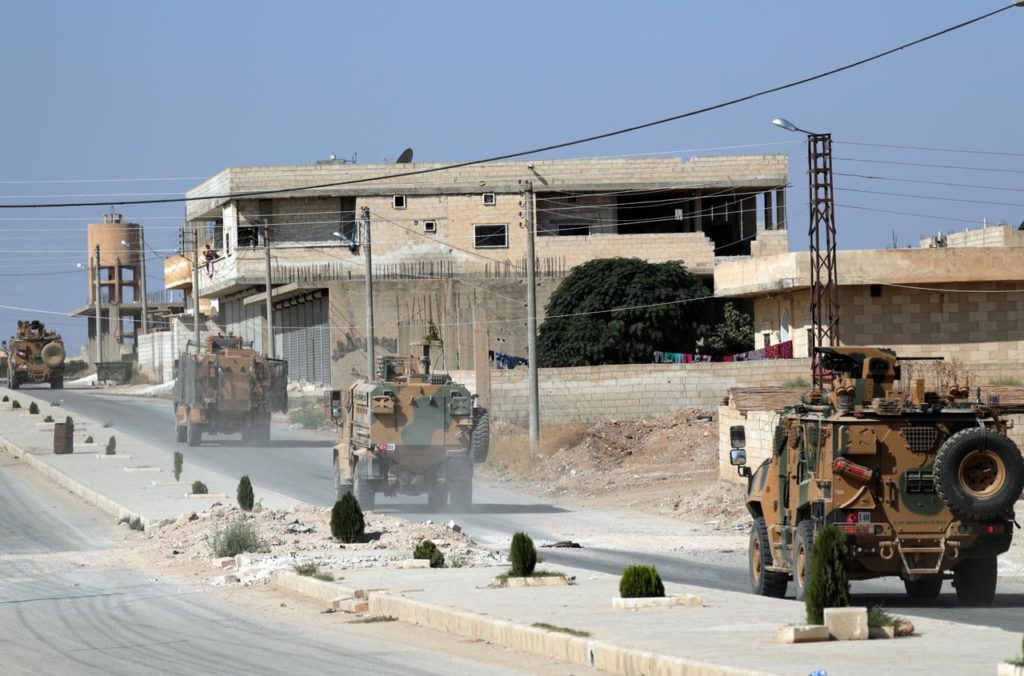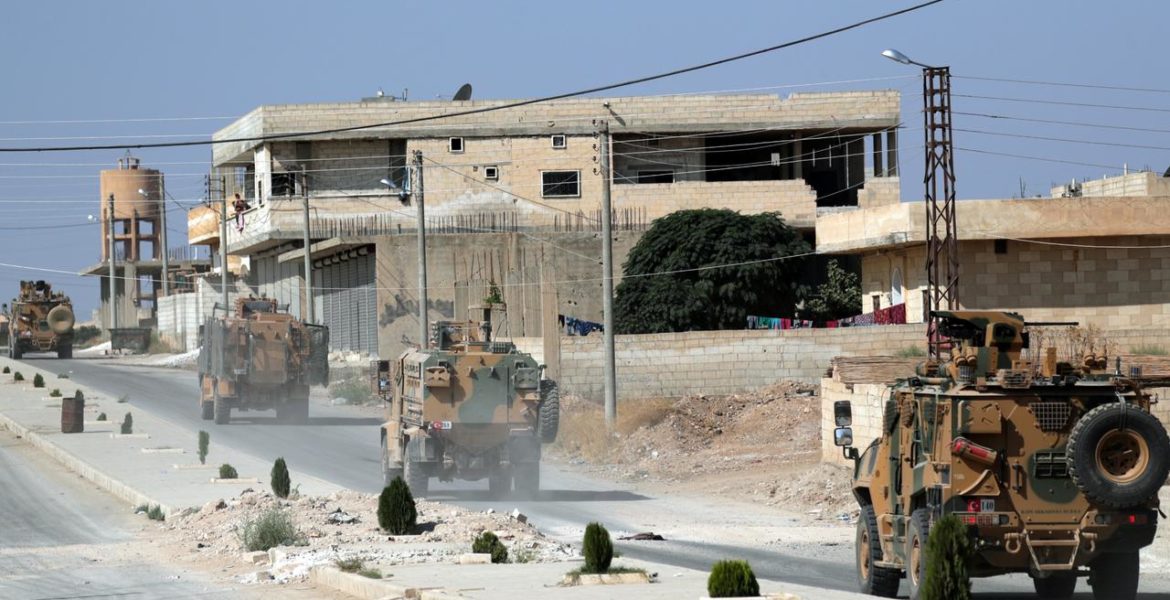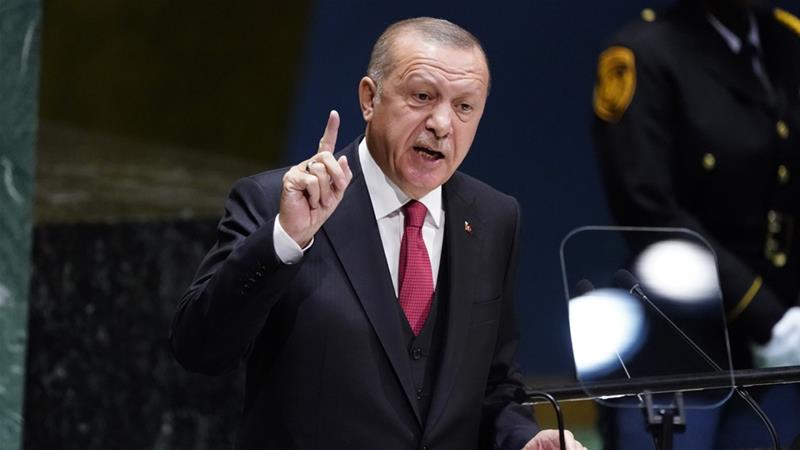By Uzay Bulut
Turkey's President Recep Tayyip Erdoğan announced on October 9 that Turkish troops together with the Syrian National Army began an incursion into northern Syria which the Turkish government has called “Operation Peace Spring”. One of Turkey’s stated goals is to establish “safe zones” in that area and to transfer Syrian refugees from Turkey to those zones.
“Our Turkish Armed Forces with Syrian National Army have started the #OperationPeaceSpring against the PKK/YPG and Daesh terrorist organizations, in northern Syria. Our aim is to wipe out the terror corridor, trying to be implemented in our southern border, and bring peace and security to the region,” Erdoğan said in a tweet.
“With Operation Peace Spring, we will eliminate the terror threats towards our country. With the SAFE ZONE we will establish, we will provide the return of Syrian refugees to their countries. We will protect the territorial integrity of Syria and save the region’s people from the claws of terror,” Erdoğan added.
Apparently, Turkey has long been preparing for this incursion. In a speech delivered on September 5 to his ruling Justice and Development Party(AKP), Erdogan said that Turkey has been “hosting about 3,650,000 Syrian refugees for the last eight years…,but that Turkey will continue taking steps [to establish a safe zone], whether [the West] supports us or not.” He continued:
"If they do not do [what we are demanding], we will have to open the gates[borders]... We have tolerated [housing so many refugees] to a certain extent. Are we the only ones to carry that burden?...
"I am saying this today: We have not got the required support from the world -- particularly from the EU -- to share the burden of the refugees we have been hosting, so we might have to [open the gates] to get that support."
By taking over northern Syria and establishing a so-called “safe zone” twenty miles deep and 280 miles wide, Turkey appears to aim for a demographic re-engineering of the region’s diverse populations, who are Assyrian Christians, Arabs, Sunni Muslim Kurds, and other communities.
However, this incursion seems to be part of an even greater agenda: Erdogan has set some benchmarks for the years 2023, 2053 and 2071.
- The year 2023 will be the 100th anniversary of the establishment of the Turkish republic in 1923.
- The year 2053 will be the 600thanniversary of the fall of Constantinople (Istanbul) to the Ottoman Turks in 1453.
- And 2071 will be the 1,000thanniversary of the 1071 Manzikert (Malazgirt) war, during which Turkic tribes from central Asia defeated the Greek Byzantine forces in the Byzantine city of Manzikert.
What are Turkey’s goals for these dates?
During its 2012 Ordinary Great Congress, the ruling Justice and Development Party (AKP) used the slogan “Great nation – Great Power, Goal: 2023” for its political vision for 2023.
Mohamed Morsi, the then president of Egypt and a leading figure of the Muslim Brotherhood, and Khaled Mashal, the chairman of Hamas, also joined the Congress. In his speech, Erdogan “saluted the struggle of the rebels” in Syria and said that “history will not forgive the countries that support the regime in Damascus.”
In 2014, Erdogan unveiled the “presidential document for the 2023 vision of Turkey” at a ceremony in Istanbul. Presenting a historical background for Turkey’s new vision, Erdogan said: “The Turkish republic was established on October 29, 1923, as a continuation of the Seljuk and Ottoman states.”
According to the 2023 report by the AKP party:
“This ideal is to turn Turkey into one of the most important actors of the global power balance and a determinant country that works to build peace and stability in the region… Today, Turkey is seen as a source of inspiration in vast geography from Morocco to Afghanistan.”

The report also introduces what it calls Turkey’s “new vision of geography”:
“Our strategic depth and effective role in our foreign policy is not restricted to the Middle East. In a very vast geography from the Balkans, to the Caucasus, from Africa to Central Asia, there is not a single country with which we do not have historical bonds and which we do not see as a partner to build the future together.”
Dissident author Bülent Falakaoğlu points out the neo-Ottoman dream of AKP’s 2023 vision. “The first part of the report envisions a ‘neo-Ottoman fantasy,’ dreaming about being the leading country of the region. The second part promises a new and great move for development.”
Another dissident author Aykut Göker also wrote a comprehensive analysis in 2013 examining Erdogan’s vision for 2023: “This is the dream country of Erdogan − a country in which political Islam of the Sunni sect reigns. A state that is based on Sunni fundamentals... Erdogan’s path is the path of Sunniism that the Ottoman Empire followed. And his goal is the Ottoman state structure.”
The AKP’s report also states that among the steps Turkey is taking to achieve global peace is “banning Islamophobia” internationally:
“Similar to the cartoon crisis, following the recent abominable movie targeting our beloved Prophet, the need for mutual dialogue and tolerance between religions and cultures in order to struggle against Islamophobia on an international platform has emerged again. Islamophobia is a dangerous tendency that poisons the relations between Islam and the Western nations. Like anti-Semitism, Islamophobia is also a form of racism and a crime against humanity. We have started a comprehensive effort to define and ban Islamophobia. We will accelerate these efforts.”
2053: Expansion of Turkey’s Lands and Regime Change?
The pro-government Turkish Asian Center for Strategic Studies (TASAM) has presented Turkey’s goals for 2053. In a report entitled “Turkey 2053 – Power and Justice”, the Center declares: “As a young and dynamic country, the Turkish republic possesses a unique geopolitical position that deserves to be the heir of the ancient Turkish, Persian, Byzantine, and Islamic historical experiences.”
The report describesTurkey’s lofty aims for developing its defense and space industries, technology, and nuclear energy, and lists some of the country’s other aims as follows:
“Rebuilding the institutional structures based on the changing nature of the state, forming new institutional models for people and civilization, providing balanced deepening on integration in the Eastern, Western, Islamic, and Turkic worlds, ranking among the top five countries in the fields of human development, competition index, efficiency index, and soft power capacity, and ranking among the first ten countries in financial development.”
The international goals of Turkey include turning the country into “a global actor” and “a regional power”. The subtitle “political goals ”also suggests a possible regime change in Turkey as one of the government’s aims: “Conducting discussions on [political] systems to find answers to the question: ‘Can presidential or semi-presidential regimes without a parliamentary regime be carried out in Turkey?’”
Pro-government columnist Bülent Erandaç wrote an article in 2014 entitled “Year 2053: The United States of Turkey.” According to the author, on the 600th anniversary of the conquest of Constantinople, Turkey will expand its territories and become “the United States of Turkey,” which will include:
- Bosnia, Macedonia, Albania (in the Balkans)
- Azerbaijan, Georgia, Nakhichevan (in the Caucuses)
- Palestine-Gaza, northern Cyprus, Tunisia, and the new state to emerge from Libya (in Africa)
- The Sunni and Kurdish mini-states in Syria, the Kurdish and Sunni mini-states of Iraq and a Kurdish-Turkish confederation in the Middle East. This formula, inspired by the Ottoman Sultan Selim the Grim and the Kurdish sheik and administrator Idris Bitlisi [who served Selim], will deliver the oil and natural wealth of the Kurds and the Kirkuk-Mosul areas to the United States of Turkey – like the USA currently does in the region.”
“So in 2053, the great Turkey will have a place in the new world order as the fourth center of power − alongside the USA, Russia and China,” concludes Erandaç.
2071: “Reaching the level of the Ottomans”
Turkey’s goals for 2071 seem to be even higher. Erdogan said in 2012 that “in 2071, Turkey will again have reached the level of the Seljuks and Ottomans.” He then called on young people to produce at least three children and “bring up the generation of 2071.”
In 1071, Seljuks, a Turkic tribe originally from Central Asia, invaded and began to conquer Asia Minor, which was then ruled by Greek Byzantines.
Echoing Erdogan’s words, the pro-government journalist Mustafa Yürekli wrote an article discussing Turkey’s goals for 2023, 2053 and 2071. He likened Erdogan to the Ottoman sultan Mehmed I for “handling disparities inside the country, wanting to globalize and being a player in the games of states.” He then asked:
“In 2071, why should we not be the state that has united the Islamic world and that has become the number one in the world with its social structure, economy and politics? Why should we not be the country that rules the world? 2071 should be planned as a year in which Turkey will actualize its world domination and global sovereignty.”
Another pro-government journalist, Ismail Kapan, wrote in 2012 that Turkey’s 2053 and 2071 visions include “the establishment of the Union of Ottoman Nations,” which are the nations within the former Ottoman borders.
Many analysts have noted that the 2023 goals of Turkey have “collapsed” and that Turkey will not be able to achieve many of the economic goals set by the government such as those concerning the nation’s gross domestic product, per capita income, employment and inflation rates. But as Turkish authorities have already made these promises to their supporters publicly, their incursion into Syria also shows that they might be trying to save face before the 2023 presidential and parliamentary elections to show that at least they have achieved some of the militaristic or territorial goals of their 2023, 2053 and 2071 agendas. One thing appears certain though: Turkey’s incursion into northern Syria aims at furthering its expansionist and neo-Ottomanist agenda in the region.
 ABOUT Uzay Bulut: Uzay Bulut is a Turkish journalist and political analyst formerly based in Ankara. Her writings have appeared in various outlets such as the Gatestone Institute, Washington Times, Christian Post and Jerusalem Post. Bulut's journalistic work focuses mainly on human rights, Turkish politics, and history, religious minorities in the Middle East and anti-Semitism. Bulut has now also become a contributor for Greek City Times.
ABOUT Uzay Bulut: Uzay Bulut is a Turkish journalist and political analyst formerly based in Ankara. Her writings have appeared in various outlets such as the Gatestone Institute, Washington Times, Christian Post and Jerusalem Post. Bulut's journalistic work focuses mainly on human rights, Turkish politics, and history, religious minorities in the Middle East and anti-Semitism. Bulut has now also become a contributor for Greek City Times.



